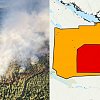Rising costs is leading to more food insecurity in the province, which in turn could put more strain on the healthcare system.
The BC Centre for Disease Control (BC CDC) has released their annual food costing report, which assesses the affordability of healthy eating for individuals and families.
According to the latest data, the average monthly cost of a nutritious diet for a family of four in BC in May and June 2022 was $1,263 per month.
Average monthly costs in 2022 in the five regional health authorities ranged from $1,193 in Fraser Health to $1,366 in Island Health.

The food costing report is typically conducted every two years. However, due to the COVID-19 pandemic, this is the first food costing report since 2017.
The BCCDC explains that food costing uses a survey tool known as the “national nutritious food basket” to assess the cost of 61 food items at grocery stores in different parts of the province.
“After a review of five different household compositions and income scenarios, the report shows many people and households who live on low incomes, especially on income or disability assistance, cannot afford a nutritious diet after paying rent,” says the report.
The report indicates that about 4% of people in BC experience severe food insecurity, which means missing meals, reducing intake or not eating for a day or more at a time.
Almost 15% or 732,000 people in BC struggle to put food on the table.

“Food insecurity is a significant public health issue,” said Dr. Geoff McKee, medical director of Population and Public Health at the BC Centre for Disease Control (BCCDC). “The price of food does not affect everyone equally and the root cause of household food insecurity are low incomes.”
Studies have found that healthcare costs are up to 76% higher for food insecure adults compared to those with sufficient access to healthy food.
For children, babies and youth living with food insecurity, that could mean increased risk of anemia, lower nutrient intake, asthma and hospitalization as well as having poorer academic outcomes and social skills.
Adults face higher rates of chronic disease, anxiety, sleep disturbance, social isolation and depression.
“Access to affordable, culturally preferable, nutritious and safe food is critical to the health and wellbeing of British Columbians,” said Dr. Charmaine Enns, medical health officer, Island Health.
“Household food insecurity takes a major toll on people's physical and mental health, social and emotional wellbeing, and on our provincial health care system.”
To read the full report, click here.
















